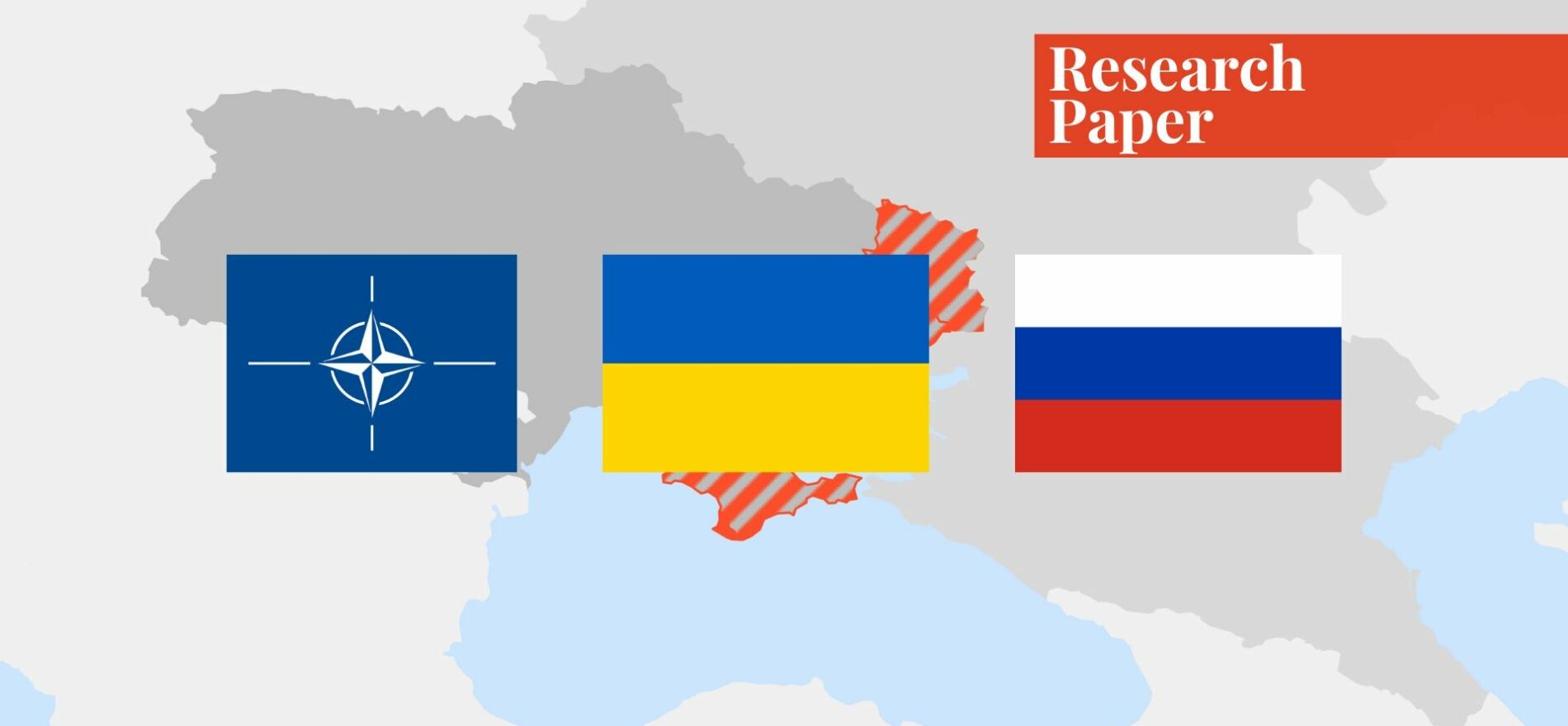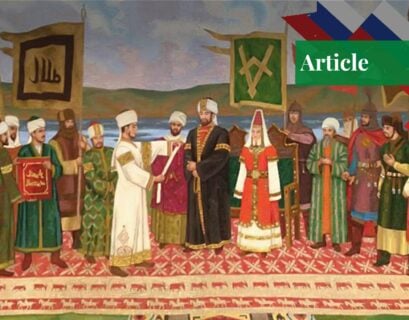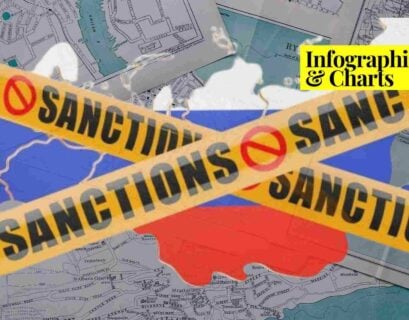Introduction
In comparison to other former Soviet Union states, Russia has grown to be the largest and most powerful nation after the breakup of the Soviet Union. This gave Russia the guts to act and choose its foreign policy, notably during Putin’s presidency. Concerning Ukraine, Russia is attempting to reassert Ukraine’s pro-Russian sentiment in an effort to enhance its political ties with Ukraine as well as to grow its power through its capacity to affect or influence other nations (Braithwaite, 2014).

Both the warring parties have their own opinion about what caused this conflict, and it is important to consider their viewpoints before making judgments of one’s own (Pikulicka-Wilczewska and Sakwa, 2015). In the years preceding the war, Ukraine was gripped by a massive economic downturn due to corruption in its government and economy, leading to mass protests in Kyiv against then-President Viktor Yanukovych in 2013.
These protests were violently suppressed by Yanukovych’s regime, resulting in over 90 deaths. The unrest led to a decision by the EU and IMF to freeze aid payments to Ukraine, prompting Russia, which had been previously propping up Yanukovych’s regime, to switch allegiance to the anti-government rebellion.
In 2014, when Crimea declared independence from Ukraine and joined Russia, this was seen as a direct result of Russia supporting the rebels (Masters, 2020). Researchers in the past have suggested that market forces and the route dependency that exists in the energy link between the EU and Russia continue to drive bilateral commerce.
Securitisation Theory
Ole Waever sparked the theory of securitisation under the scope of the Copenhagen School where he divided security issues and the theory of securitisation into different discussions. Talking about security cases means not only relating it to security in general but also involving it in the military, political, economic, social, and environmental fields.
According to this theory, issues are given priority and constructed as existential danger via ‘speech acts’, where the ‘securitising actor’ persuades the audience that the issue is a threat to the ‘referent object’ that needs to be protected (Baysal, 2020). It provides a precise understanding of who (securitising actors) securitises (declaring existential threat) what (issues), for who (referent objects), and why (under what conditions) (Salter & Mutlu, 2013).
After the securitisation of Ukraine, Russia prioritised it, and extraordinary measures were legitimised to deal with it. According to Copenhagen School scholars, securitisation is an intense version of politicisation in which a securitising actor pulls an issue out of the political realm and takes it into the security realm (Baysal, 2020).
Thus, this study will discuss the war that occurred between Russia and Ukraine from the perspective of securitisation theory which involves several fields and points of view. In conducting a review of the literature, the researchers discovered that the conflict between Russia and Ukraine was based on instances of the economic security sector.
Since security is a social and political construct ultimately determined by securitisation actors, security studies must defend the economic security sector (Floyd, 2019). Furthermore, in order to develop the securities market effectively, it is necessary to improve the macroeconomic situation in the country, increase the ease of doing business, introduce innovative financial instruments, and take into account the rapid global development of digital technology in business (Matsuk & Heinemann, 2020).
Research Methodology
This study employs descriptive qualitative research methodologies, which may describe research findings without the use of statistics. The data was obtained through literature surveys of prior studies or publications, as well as secondary data sources, and was then examined and aided by the theories and concepts used in this research until unambiguous research results could be formed. The triangulation technique, on the other hand, was used to assess the correctness of the research data.
Analysis
One of the main arguments that are used by the Russian government for the invasion of Ukraine was the NATO expansion in the post-cold war era. NATO, a military alliance, was established in 1949 to safeguard the interests of Western Europe during the cold war era. It was a success in the beginning, as it could contain the expansion of the Soviet Union, maintain peace, and facilitate the political and economic unification of Western Europe.
Following the collapse of the Soviet Union, NATO was expected to lose its relevance and dissolve ultimately, but several countries in Southern and Central Europe and the US supported the expansion of NATO, which lead to the inclusion of more than a dozen countries into the alliance (Kimmage, 2022). These countries included a bunch of former Soviet states as well.
With the collapse of the Berlin Wall and the integration of East and West Germany, unified Germany formally joined NATO in 1990. The Central European states such as Poland, Czech Republic, and Hungary joined in 1999, and the Baltic States including Estonia, Latvia, and Lithuania with Romania, Slovenia, Bulgaria, and Slovakia joined in 2004. NATO was further expanded when Croatia and Albania became part of the alliance in 2009, Montenegro in 2017, and most recently, North Macedonia joined the alliance in 2020 (Marberry, 2022).
Today, NATO is the largest military alliance in the world having 30 countries as its members, with Ukraine next in line. Russia considers that the enlargement of NATO towards the east a threat to its security (Richter, 2022). President Putin has made Ukraine’s preparatory measures to be a member of NATO the key reason for the invasion of Ukraine.
Although NATO’s leaders have always given the impression that every European country is sovereign enough to take a decision to join NATO, the eastward enlargement of NATO infuriated Putin because, as he recalled, in 1990, the Western leadership including the Secretary of State of the US James Baker promised the Soviet leader Mikhail Gorbachev that the military alliance would not grow eastward, not even a single inch.
Therefore, President Putin maintains that the West deceived Russia after the cold war as several countries in Eastern Europe have joined NATO. The mastermind of the policy of ‘containment’ of the USSR and strategy for fighting the cold war, George Kennan, must have anticipated this reaction. In 1997, he wrote that “expanding NATO would be the most fateful error of American policy in the entire post-cold-war era.”
He further maintained that “It is possible that such a decision will fuel nationalistic, anti-Western, and militaristic inclinations in Russian society, hinder the growth of Russian democracy, revive the cold war’s atmosphere in East-West relations, and influence Russian foreign policy in ways that are decidedly unfavourable to the United States.” (Moskowitz, 2022).
However, in the time prior to the Russian invasion of Ukraine, Moscow raised concerns and put forward a pile of demands for the assurance of Russian security from the West, especially from NATO. Russia actually desires that NATO return to its pre-1997 existence.
The other argument by Russia for the securitisation of Ukraine and justification of its invasion was the Ukrainian government’s purported persecution and extermination of the country’s Russian-speaking population, a claim that was categorically denied by Ukraine, the US, and the EU.
Russia has given more than 700,000 passports in the Donetsk and Luhansk areas while maintaining this claim (Manullang et al., 2022). Vladimir Putin stated on March 5, 2022 that the voennaja operacija, or “war operation,” or “special operation,” is intended to safeguard the people who have been subjected to persecution and genocide by the Kyiv [Kiev] administration for eight years. In order to do this, Russia intends to “demilitarize and degasify Ukraine” and prosecutes all war criminals who have committed “bloody crimes against civilians, including people of the Russian Federation.” (Fortuin, 2022).
Conclusion
In light of this evidence, it is crystal clear that Russia used the post-cold war NATO expansion as one of its justifications for the securitisation of Ukraine. It was anticipated that after the fall of the Soviet Union, NATO would become obsolete and eventually disband. In 1990, the newly united Germany formally ascended to NATO membership following the fall of the Berlin Wall and the unification of East and West Germany, followed by several former Soviet and other countries.
Moreover, Russia presented the genocidal treatment of Russian-speaking citizens in Ukraine as another reason for the securitisation. However, Moscow expressed worries and made a number of requests for the West, particularly NATO, to guarantee Russian security in the period before the Russian invasion of Ukraine.
Today, it is evident that Russia aims to depose Ukraine’s democratically elected government, allowing the securitisation of Ukraine to be justified on the grounds of protecting the populace.
References
- Baysal, B. (2020). 20 Years of Securitization: Strengths, Limitations and a New Dual Framework. Uluslararasi Iliskiler, 17(67), 3–20. https://doi.org/10.33458/uidergisi.777338
- Bloomberg. (2022, May 15). Understanding the Roots of Russia’s War in Ukraine. https://www.bloomberg.com/news/articles/2022-03-02/understanding-the-roots-of-russia-s-war-in-ukraine-quicktake?leadSource=uverify wall
- Braithwaite, R. (2014). Russia, Ukraine and the West. RUSI Journal, 159(2), 62–65. https://doi.org/10.1080/03071847.2014.912805
- Floyd, R. (2019). Evidence of Securitisation in the Economic Sector of Security in Europe? Russia’s Economic Blackmail of Ukraine and the EU’s Conditional Bailout of Cyprus. European Security, 28(2), 173–192. https://doi.org/10.1080/09662839.2019.1604509
- Fortuin, E. (2022). “Ukraine commits genocide on Russians”: the term “genocide” in Russian propaganda. Russ Linguist, 46, 313–347. https://doi.org/https://doi.org/10.1007/s11185-022-09258-5
- Kimmage, M. (2022). Time for NATO to Close Its Door: The Alliance Is Too Big and Too Provocative for Its Own Good. https://www.foreignaffairs.com/articles/russia-fsu/2022-01-17/time-nato-close-its-door
- Manullang, S., Maruf, I., Priyono, H., Br Sembiring, T., & Hendriarto, P. (2022). International Law to Understand Russia’s Invasion of Ukraine 2022: Between Self-Defense and Defiance. Legal Brief, 11(2), 760–769.
- Marberry, A. (2022). Defense Integration and Economic Growth in the North Atlantic. SSRN, 30. https://doi.org/http://dx.doi.org/10.2139/ssrn.4281186
- Masters, J. (2020). Ukraine: Conflict at the Crossroads of Europe and Russia. Council on Foreign Relations (CFR). https://www.cfr.org/backgrounder/ukraine-conflict-crossroads-europe-and-russia#chapter-title-0-5
- Matsuk, Z., & Heinemann, A. (2020). Global Trends and Challenges in the Securities Market in Ukraine. International Economic Policy, 2(32–33), 156–177.
- Moskowitz, K. (2022). Was NATO Expansion Really the Cause of Putin’s Invasion? American Diplomacy. https://americandiplomacy.web.unc.edu/2022/05/was-nato-expansion-really-the-cause-of-putins-invasion/
- Pikulicka-Wilczewska, A., & Sakwa, R. (2015). Ukraine and Russia: People, Politics, Propaganda and Perspectives. In E-international Relations. E-International Relations.
- Richter, W. (2022). NATO-Russia Tensions: Putin Orders Invasion of Ukraine. German Institute for International Security Affairs, SWP Comment (16), 1–8.
- Salter, M. B., & Mutlu, C. E. (2013). Research Methods in Critical Security Studies. Routledge.
- Sperling, J., & Webber, M. (2017). NATO and the Ukraine Crisis: Collective Securitisation. European Journal of International Security, 2(1), 19–46. https://doi.org/10.1017/eis.2016.17
- Taureck, R. (2006). Securitization Theory and Securitization Studies. Journal of International Relations and Development, 9, 53–61. https://doi.org/http://dx.doi.org/10.1057/palgrave.jird.1800072
If you want to submit your articles and/or research papers, please check the Submissions page.
The views and opinions expressed in this article/paper are the author’s own and do not necessarily reflect the editorial position of Paradigm Shift.




















